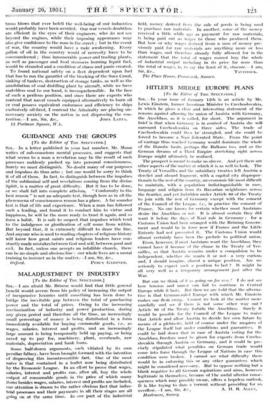HITLER'S MIDDLE EUROPE PLANS [To the Editor of TH E
SPECTATOR.] Sin,—In your issue of .January 12th is an article by Mr. Lewis Einstein, former American Minister to Czechoslovakia, in which he gives a clear and interesting statement of the reasons against allowing the union of Austria with Germany, the Ansehluss, as it is called, for short. The argument in brief is that when Germany is in control of Austria she will surround Czechoslovakia on three sides. The trade of Czechoslovakia could then LW, strangled, and she could be forced to become a Nazi federated State. From the point of-vantage thus reached Germany would dominate the whole of the Danube basin, perhaps the Balkans too, and so the German dreams of a Third Empire stretching right across Europe might ultimately be realized.
- The prospect is meant to make us shiver. And yet there are other aspects of the matter at which it is as Well to look. The Treaty of Versailles and the subsidiary treaties left Austria a derelict and absurd fragment, with a capital city dispropor- tionate to the rest of the country, an economic life most difficult to maintain, with a population indistinguishable in race, language and religion from its Bavarian neighbours across the frontier, and yet forbidden under Article 80 of the Treaty "to join with the rest of Germany except with the consent of the Council of the League, i.e., in practice the consent of France. No one knows for certain whether most Austrians desire the Ansehluss or not. It is almost certain they did want it before the days of Nazi rule in Germany ; for a Customs Union had been arranged with the Bruning Govern- ment and would be in force now if France and the Little Entente had not prevented it. The Customs Union would almost certainly have been the prelude to political union.
Even, however, if most Austrians want the Ansehluss, they cannot have it because of the clause in the Treaty of Ver- sailles, so that Austria miming under a compulsion to be Independent, whether she wants it or not—a very curious
• and, I should imagine, almost a unique position. Arc we seriously to expect such a position to last ? It might be all very well as a temporary arrangement just after the War.
But can we think of it as going on for ever ? I do not. see bow tension and unrest can fail to continue in Central Europe while it lasts. But then we are told that the alterna- tive is that German-ruled Europe with which Mr. Einstein makes our flesh creep. Cannot we look at the matter more carefully and see if there is not some other way out ? Article 80 of the Treaty forbids the Ansehluss. Surely it would be possible for the Council of the League to waive that Article and allow Austria to decide her own future by means of a plebiscite, held of course under the auspices of the League itself but under conditions and guarantees. It could be laid down that in case of Austria voting for the Ansehluss, freedom must he given for exports from Czecho- slovakia through Austria or Germany, and it could be pre- cisely stipulated what penalties on German trade would come into force through the League of Nations in case this condition were broken. I cannot see what difficulty there would be in enforcing this or any other guarantees which, might be considered necessary. But to oppose nothing but a blank negative to all German aspirations and aims, however legitimate in themselves, because of the awful ulterior conse- quences which may possibly ensue, offers a hopeless outlook. It is like trying to dam a torrent without providing for an
Hastemere, Surrey.
LLEN.










































 Previous page
Previous page